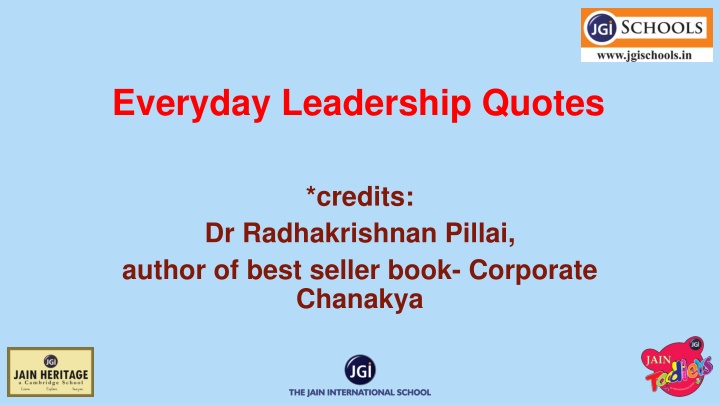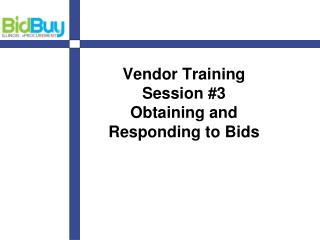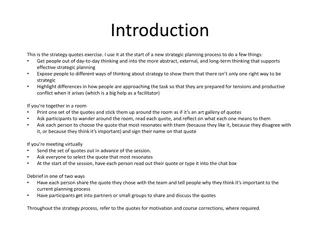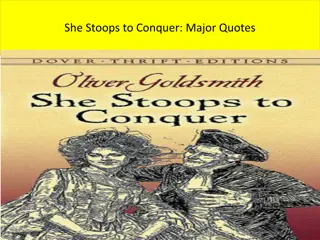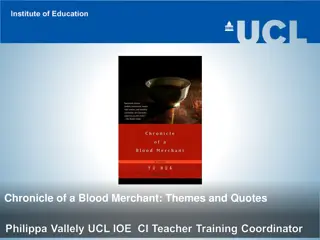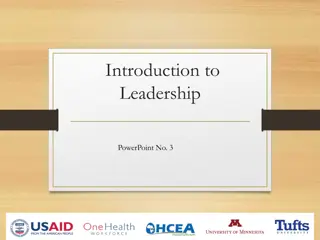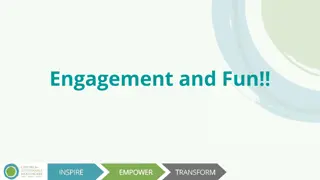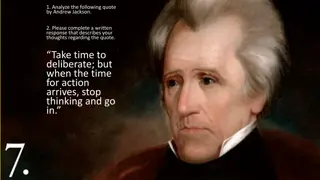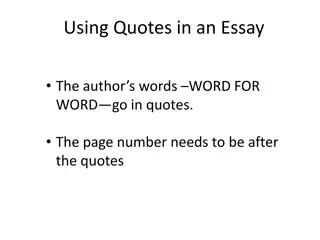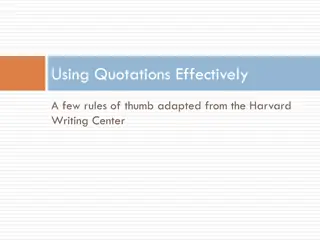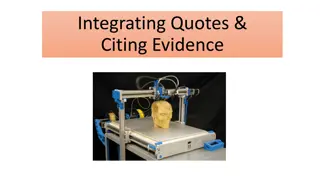Everyday Leadership Quotes
Dive into insightful leadership quotes by Dr. Radhakrishnan Pillai, author of the best-selling book "Corporate Chanakya." Learn about the essence of leadership, influencing others, and the impact of a leader's energy and diligence on their subjects. Discover valuable lessons on being a role model and maintaining enthusiasm in leadership, avoiding laziness, and the consequences of lackluster leadership. Explore the importance of constant learning and perspective thinking in effective leadership.
Download Presentation

Please find below an Image/Link to download the presentation.
The content on the website is provided AS IS for your information and personal use only. It may not be sold, licensed, or shared on other websites without obtaining consent from the author.If you encounter any issues during the download, it is possible that the publisher has removed the file from their server.
You are allowed to download the files provided on this website for personal or commercial use, subject to the condition that they are used lawfully. All files are the property of their respective owners.
The content on the website is provided AS IS for your information and personal use only. It may not be sold, licensed, or shared on other websites without obtaining consent from the author.
E N D
Presentation Transcript
Everyday Leadership Quotes *credits: Dr Radhakrishnan Pillai, author of best seller book- Corporate Chanakya
1. In the happiness of the subjects lies the benefit of the king and in what is beneficial to the subjects is his own benefit (1.19.34)
2. || nv k ik is ever thought of as the lamp of all sciences, as the means of all actions (and) as the support of all laws and duties (1.2.12)
3. , He should have constant association with elders in learning for the sake of improving his training, since training has its root in that (1.5.11)
4. : If the king (leader) is energetic, his subjects will be equally energetic (1.19.1) Be a role model leader. Whatever you do others follow.
5. If the king (leader) is slack and lazy in performing his duties, the subjects will also be lazy(1.19.2) Leaders should not be lazy. If that happens even others will become lazy
6. If the (leader) is lazy (in performing his duties) the subjects thereby, eat into his wealth. Lazy leader makes others lazy. And then they take the wealth and become corrupt. (1.19.3)
7. A lazy king (leader) will easily fall into the hands of the enemies (1.19.4) If the leader is lazy then the competition will take over. Due to your laziness the enemies win.
8. : Hence, the king should himself always be energetic (1.19.5) A leader always has to be enthusiastic and energetic. And make others also enthusiastic and energetic.
9. : ( . . ) The affairs of a king (leader) are (of three kinds, viz.,) directly perceived, unperceived and inferred(1.9.4) The leader should be a perspective thinker. Thinking is a leader s main work.
10. , He (leader) should constantly hold an inspection of works (2.9.2) A leader should regularly inspect and supervise the work being done by his people
11. Leader should constantly inspect works. Men being inconstant in their minds(2.9.2) Without inspection people will not work as their minds are unsteady
12. ( . . ) Continuous study ensures a trained intellect A leader should study continuously. He has to be a life long learner. By regular study one becomes intelligent and brilliant
13. ( . . ) from intellect (comes) practical application If you are intelligent you should apply ideas practically. Leadership is about intelligent execution
14. ( . . ) From practical application (results) self- possession When a leader applies ideas practically and succeeds, there is a sense of satisfaction and contentment
15. ( . . ) The King, The Minister, The Country, The Fortified City, The Treasury, The Army and The Ally are the constituent elements of a kingdom
16. Qualities of a SWAMI (The Leader) Intelligent and dynamic Given to seeing elders Truthful in speech Not breaking promise Grateful Desirous of training Easily approachable (6.1.3)
17. ( . . ) Leadership can be successfully carried out (only) with the help of associates. One wheel alone does not turn
18. ( . . ) Leadership can be successfully carried out (only) with the help of associates. One wheel alone does not turn
19. ( . . ) Under the supervision of the officer, he should carry out the task assigned with special zest The minister (manager) should work with enthusiasm along with the king (leader)
20. ( . . ) They shall obey the orders of one (leader) who proposes what is beneficial to all People shall listen to the leader who works towards the benefit of the people
21. ( . . ) He (The Leader) should hear (at once) every urgent matter, (and) not put it off Leaders should be good listeners. And they should be quick decisions makers.
22. An (affair) postponed becomes difficult to settle or even impossible to settle (1.19.30) Procrastination has to be avoided by leaders. Do your work right here and now
23. : ( . . ) The means of starting undertakings How to think (1) - Before starting any activity think through the means required. Have a goal and begin with the end in the mind.
24. ( . . ) The excellence of men and material How to think (2) - While doing any work think about the resources required. The people and material have to be used optimally
25. ( . . ) Determination and allocation of the suitable place and time How to think (3)- One should be able to decide the right place and time for doing a work, and allocate work accordingly
26. : ( . . ) Provision against failure How to think (4)- Have backup plans for every action, person and situation
27. - ( . . ) Accomplishment of work How to think (5) - If you have started something, make sure it is completed. Leadership is making sure results are achieved. Start and stop not till the end.
28. 5 steps of thinking (deliberations) 1.The means of starting undertakings 2.The excellence of men and material 3.Allocation of right time and place 4.Provision against failure 5.Accomplishment of work
29. " ( . . ) He should secure an undertaking requiring little expenditure and yielding large profit and get a special advantage Be focused on profits !!!
30. ( . . ) He should establish contacts with forest chieftains, frontier-chiefs and chief officials in the cities and the countryside - Leader have good contacts with other leaders
31. ( . . ) One doing whatever pleases him does not achieve anything Do not do anything impulsively. Control yourself, think through all scenarios and then act wisely
32. , ( . . ) And those who are without relations have to be necessarily maintained
33. ( . . ) He should declare without loss of time what is in the King s interest, and beneficial (to the King) We should immediately say what is good for the leader and our country
34. Say at the proper place and time what is in the interest of another, which connects spiritual and material well-being (5.4.11) Always tell what is good for others at the right time and place
35. ( . . ) The king brings under his sway his own party as well as the party of the enemies, by the use of the treasury and the army - To become a winner keep finances and people with you
36. ( . . - ) The king severe with rod (punishment) becomes a terror. A king with mild rod is despised. The king just with the rod is honoured
37. ( . . ) If the rod is not used at all the stronger swallows the weak in the absence of the wielder of the Rod If the leader does not punish, bullying happens
38. , ( . . ) In case the employee misses the time (of completion) or does the work in a wrong manner, he may complete the work through another
39. . . ( . . ) From the capacity for doing work is the ability of the person judged -Each person has different capacity to work. Judge the ability of the person before allocating work
40. -- _ . . And in accordance with the ability, give the suitably rank among ministers and assign right place, time and work (1.8.28) Ability decides everything
41. _ ( . . ) Having checked the capacity and ability, the (King) should appoint all the ministers Only after checking all required qualities, the leader should appoint his managers
42. After ascertaining the relative strength or weakness of powers, place, time, revolts in rear, losses, expenses, gains and troubles, of himself and of the enemy, the conqueror should march (9.1.1) Think deep and then attack the enemy
43. ( . . ) He should despise none, (but) should listen to the opinion of every one A leader should be a good listener. Listen to everyone
44. _ . ( . . ) A wise man should listen and make use of the sensible words of even a child Respect and listen to children. They may give you a brilliant idea
45. . . ( . . ) All undertakings should be preceded by consultation Before starting any activity consult an expert. Thus you will not make mistakes
46. . ( . . ) Holding a consultation with only one, he may not be able to reach a decision in difficult matters Don t just consult one person. Check with three experts.
47. _ . , ( . . ) With more councillors it is difficult to reach decisions and maintain secrecy If you consult too many people you will get confused
48. . ( . . ) Therefore sit and counsel with those who are matured in intellect Always get advice from matured and experienced people. Not from beginners.
49. . _ ( . . ) In an urgent matter, he should call together the councillors as well as the council of ministers and ask them Even if the matter is urgent consult experts
